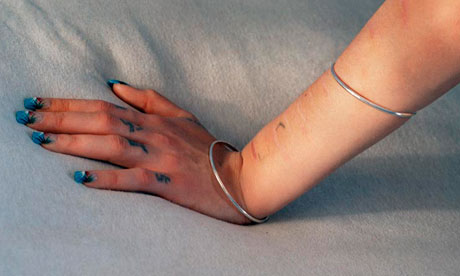
Trafficked … specialist women's service the Poppy Project faces an uncertain future. Photograph: Karen Robinson for the Guardian
Catherine Robinson: Proven expertise, overlooked by government
 I am an immigration solicitor, and a number of my clients have been trafficked to the UK for the purposes of sexual exploitation and domestic servitude. Some of my clients have been supported by the Poppy Project. However, the Ministry of Justice has recently decided to change providers for services to adult victims of trafficking and has awarded funding for the next two years to the Salvation Army.
I am an immigration solicitor, and a number of my clients have been trafficked to the UK for the purposes of sexual exploitation and domestic servitude. Some of my clients have been supported by the Poppy Project. However, the Ministry of Justice has recently decided to change providers for services to adult victims of trafficking and has awarded funding for the next two years to the Salvation Army.From my point of view, it is deeply disappointing that the Poppy Project's proven expertise in working with trafficked women has not been given proper recognition or weight by the Ministry of Justice. The project has extensive experience; it houses women in safe, women-only properties in London, Cardiff and Sheffield and provides intensive support addressing their myriad complex emotional, psychological and practical needs. Between March 2003 and March 2011, it received 1,869 referrals, housed and supported 334 women, and provided outreach support to a further 449, all of whom were trafficked into, and exploited in the UK. The top five country of origin for referrals are Nigeria, China, Lithuania, Albania and Romania.
Poppy's support to my clients has been invaluable. Their reports and assessments are recognised by the UK courts, from the immigration and asylum tribunal to the criminal court of appeal. This is key, as often the UK Border Agency does not believe what has happened to my clients. The Poppy Project was also one of the five interveners in the case of M v UK, which was the first trafficking case from the UK to be considered by the European court of human rights. The court allowed the Poppy Project to intervene to provide expertise on the issue of risk of re-trafficking.
Many of the cases are complex. For example, one of my clients was trafficked to the UK from Jamaica. At her first asylum appeal she represented herself – she was unwell at the time and unable to tell her story to the judge. Her appeal was dismissed. She was subsequently referred to the Poppy Project. We made a fresh asylum application supported by reports from the Poppy Project and she has been granted limited leave to remain. She has received a huge amount of intensive support from the team. She is now in her own accommodation and very recently got a job, thanks to their support, which included a referral to a Ready for Work programme.
A gender-specific and specialist service with a proven track record of providing high quality and intensive support is vital to trafficked women given their experiences of gender-based violence. This does not mean that there should not be other services providing support for other groups of individuals, but the Poppy Project has been the specialist service for women – and it is a very big shame that has not been recognised by this government.
• Catherine Robinson is an immigration solicitor at Fisher Meredith LLP. Her practice includes representing women who have been trafficked to the UK and victims of domestic violence. She was one of the lawyers in the case of M v UK
Nichi Hodgson: Why did the Poppy Project support the Policing and Crime Act?
 The Poppy Project has undoubtedly done much for trafficked women. But in approving the appalling myopia of the Policing and Crime Act (2009), Poppy only further endangered all sex workers.
The Poppy Project has undoubtedly done much for trafficked women. But in approving the appalling myopia of the Policing and Crime Act (2009), Poppy only further endangered all sex workers.Section 21 deals with new brothel closure orders that were designed to stop traffickers exploiting hordes of sex workers. The orders allow police to make arrests where they merely suspect (no proof needed) that two or more prostitutes are operating together; where they have received just one public complaint of antisocial behaviour (which can be sex work itself); or where there are sex workers "incited" or "controlled for gain". Neither Poppy nor the Home Office considered that traffickers could just separate prostitutes to cover their tracks, increasing their victims' invisibility and the risk of abuse from punters and traffickers alike. Meanwhile, that "causing" or "inciting" prostitution permits closure means that many non-trafficked prostitutes can be accused of exploiting each other.
After a flurry of token raids early on, we are still waiting for the grand ring-cracking statistics resulting from the act. Instead, the most significant prostitution-related arrest in this period was Stephen Griffiths for the murder of three Bradford sex workers last May. The new law and the Griffiths case were not directly connected, but the latter highlighted the need to allow non-trafficked sex workers to operate in the safer space of brothels, rather than pushing them to work on the streets, where they are at greater risk of drug addiction and extreme violence. In advising the Home Office to increase police involvement, the Poppy Project ignored the long-running antagonisms between law-enforcers and sex workers. The law has increased police power to criminalise sex workers, something they claimed it opposed.
The Poppy Project believes it deserves funding because it is the only dedicated support service for trafficked women, and has claimed to be the only service offering accommodation. This ignores both the Medaille Trust's accommodation provision, and the vital work done by the the Helen Bamber Foundation. Both provide victim support, irrespective of gender, as does the Salvation Army. Focusing on female trafficking victims ignores the needs of men and transgender sex workers who are particularly vulnerable in the sex industry. Fewer men than women are trafficked for sex, but as a prison officer at a male young offenders institute pointed out to me, 60 of its 800 inmates have been trafficked in circumstances of enforced hard labour or drug-smuggling. Sex-trafficked women are not the only victims.
Trying to agglomerate both trafficked and non-trafficked sex work offences, the Policing and Crime Act 2009, backed by the Poppy Project, spurned the Palermo protocol's precise definition of trafficking for the oblilque "controlled for gain". Victims of sex trafficking deserved their own law. The Poppy Project could have recommended this. But it didn't. Without government funding, Poppy is now free to pursue its ideological agenda and develop its specialised, women-only service. David Cameron's anti-trafficking budget, inadequate as it is, should fund an organisation with a wider remit.
The value of the Poppy Project | Catherine Robinson and Nichi Hodgson http://t.co/c8Fx0fx via @guardian
No comments:
Post a Comment